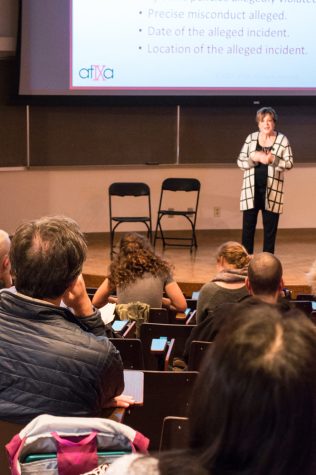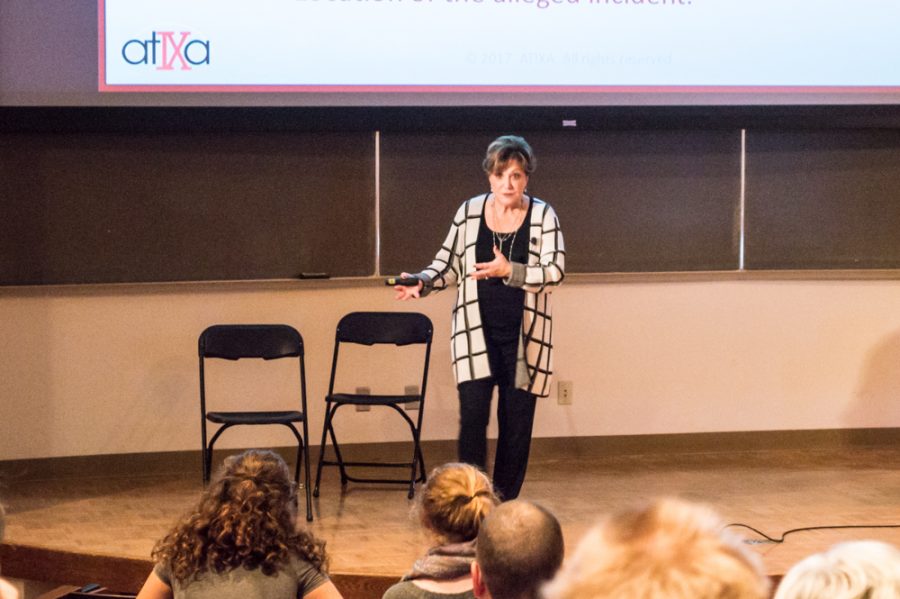Schuster Explains Changes to Federal Title IX Guidelines
October 25, 2017
Two days ago, Saundra K. Schuster, who serves as Whitman’s Title IX Legal Consultant, visited campus to give a public presentation regarding the Department of Education’s recent announcement to rescind the 2011 Dear Colleague Letter that provided colleges and universities with guidance in adhering to Title IX while handling cases of campus sexual misconduct.
In addition to the 2011 letter, the department also rolled back an accompanying list of Q&As sent to colleges in 2014, and replaced both documents with an interim Q&A document.

The interim Q&A serves as temporary guidance to schools handling sexual misconduct cases while the Department of Education drafts new regulations defining how schools should adhere to Title IX. The temporary guidance, like the former 2011 Dear Colleague Letter, is not legally binding. Later regulations, however, will be. Schuster predicts that a draft of such regulations will be available in the next four to six months, followed by a period of about three months in which anyone may send in comments. The final version of the law is due to be implemented in approximately 11 to 17 months.
While no one is sure of the shape that the binding regulations will take, Schuster predicts that the rules will reflect many of the changes in the interim Q&A. In a conference call with higher education attorneys Candice Jackson, an Office of Civil Rights Official with the Department of Education, called the interim guidance a “roadmap” for the future regulations.
In general, Schuster emphasized what she referred to as a “new lens” adopted by the Department of Education since President Trump’s appointment of Betsy DeVos as Secretary. While the previous administration in particular, under the leadership of former Vice President Biden, focused on the rights of survivors, the interim Q&As, according to Schuster, are more concerned with the Due Process rights of the accused.
What could this mean for Whitman?
Among the major changes in guidance is the option for campuses to chose between the “preponderance of the evidence” standard and the “clear and convincing” standard when evaluating cases of sexual misconduct, so long as the standard of evidence used for evaluating cases of sexual misconduct matches the standard used for other student violations of the college’s code of conduct. The 2011 guidance, in contrast, emphasized the importance of using the “preponderance of the evidence” standard as a more equitable way of deciding cases of sexual assault.

The “preponderance of the evidence” standard requires that a case be more likely than not to have occurred in order for that case to be decided in favor of the claimant. Whitman currently employs the “preponderance of the evidence” standard for all cases of student misconduct, leaving the college in line with the interim Q&A.
Schuster thinks that the direction that the new regulations take, however, could have an impact on Whitman’s policies.
“I think they’ll change the standard of evidence to clear and convincing,” Schuster said in an interview, in reference to the upcoming regulations.
Additionally, Schuster emphasized that the interim Q&As allow colleges the choice between instituting an appeals policy which grants both the claimant and the respondent the opportunity to appeal, and instituting a policy which would only give the responding party the opportunity to appeal.
Both these changes, Schuster says, could have a “chilling effect,” discouraging survivors from reporting.
Schuster added that Whitman could also be affected by an internal memo, sent last March, that altered the guidelines for investigations from the Office of Civil Rights (OCR). OCR investigations result from complaints made by members of the campus community regarding the handling of a case related to Title IX. While previous investigations have centered on evaluating a college or university’s sexual misconduct policy as a whole, the internal memo stated that investigators should focus on the particular case which resulted in the complaint.
Whitman currently has two open cases with the OCR. The new focus for investigators will be relevant for future cases brought to the OCR and Schuster anticipates that the OCR will “quietly close” any currently open cases.
Until the open comment period and the later final draft of the regulations, Schuster maintains that it is difficult to determine any effect a change in federal policy might have at Whitman. Currently, Schuster said she is encouraging Whitman to stick to its present policies until more information becomes available.







